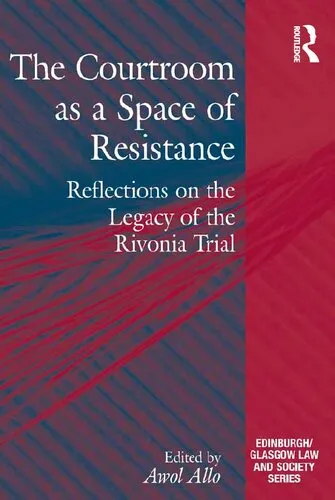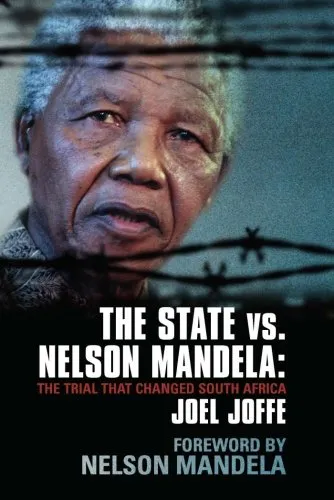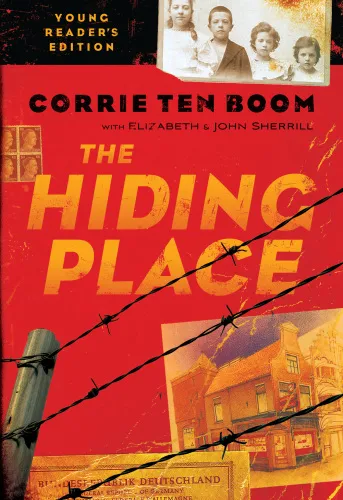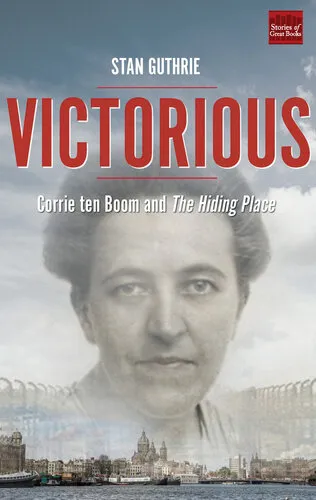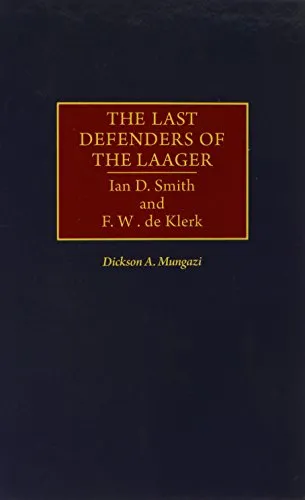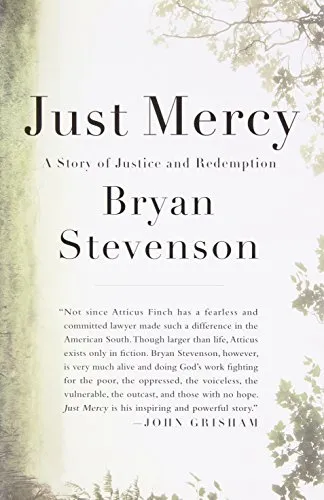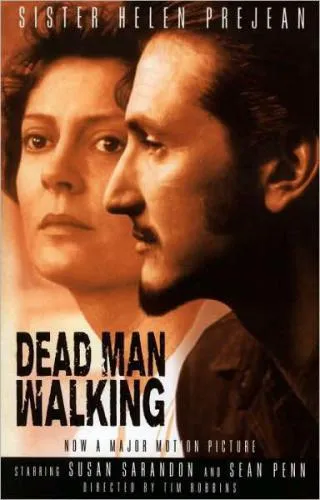The Courtroom as a Space of Resistance: Reflections on the Legacy of the Rivonia Trial
4.3
بر اساس نظر کاربران

شما میتونید سوالاتتون در باره کتاب رو از هوش مصنوعیش بعد از ورود بپرسید
هر دانلود یا پرسش از هوش مصنوعی 2 امتیاز لازم دارد، برای بدست آوردن امتیاز رایگان، به صفحه ی راهنمای امتیازات سر بزنید و یک سری کار ارزشمند انجام بدینکتاب های مرتبط:
معرفی کتاب 'The Courtroom as a Space of Resistance: Reflections on the Legacy of the Rivonia Trial'
کتاب 'The Courtroom as a Space of Resistance: Reflections on the Legacy of the Rivonia Trial' به قلم اوول آلو، نگاهی دقیق به دادگاه Rivonia دارد که نقشی حیاتی در جنبش مقاومت آفریقای جنوبی علیه آپارتاید ایفا کرد. این کتاب با تحلیلهای ژرف درباره چگونه دادگاهها میتوانند به مکانهایی برای مقاومت فعال تبدیل شوند، تلاشی است برای درک قدرت کلام و عمل در مقابل ظلم.
خلاصه جامع کتاب
این کتاب به بررسی فرآیندهای دادگاهی پرداخته و به ما نشان میدهد که چگونه در شرایطی که قدرت سیاسی به شدت مستقر است، فضاهای حقوقی میتوانند به ابزارهای تغییر اجتماعی و مقاومت در برابر بیعدالتی تبدیل شوند. دادگاه Rivonia، محلی که نلسون ماندلا و دیگر اعضای کنگره ملی آفریقا محاکمه شدند، به عنوان یک نمونه تاریخی از چگونگی تبدیل یک فضای ظاهراً افقی به مکانی برای مبارزه علیه بیعدالتی، مورد بررسی قرار میگیرد.
نکات کلیدی
- بررسی پتانسیل دادگاهها به عنوان فضاهایی برای مقاومت سیاسی و اجتماعی.
- تحلیل نقش نلسون ماندلا و رفقایش در استفاده از این چارچوب قانونی برای پیشبرد اهداف جنبش آزادیخواهانه.
- اندیشیدن به نحوهای که تاریخ مبارزات حقوقی قادر است نسلهای بعدی را به مقاومت در سایر اشکال بیعدالتی برانگیزد.
نقلقولهای مشهور از کتاب
"در فضای دادگاه، کلمات میتوانند به شمشیر تبدیل شوند، اگر به درستی و با شجاعت استفاده شوند."
"Rivonia Trial نقطه عطفی بود که نشان داد حتی در شدیدترین شرایط، حقیقت قدرت دارد."
چرا این کتاب اهمیت دارد
این کتاب نه تنها جنبههای تاریخی و سیاسی دادگاه Rivonia را بررسی میکند، بلکه به چگونگی استفاده از دادگاهها به عنوان ابزارهای قدرت بخشیدن به صداهای مظلوم و ایجاد تغییرات اجتماعی نیز میپردازد. درسهایی که این کتاب ارائه میدهد برای کسانی که در حال مبارزه با بیعدالتی در سراسر جهان هستند، الهامبخش و آموزنده است. 'The Courtroom as a Space of Resistance' خواننده را دعوت به تأمل درباره نقش مدافعان حقوقی در تغییر اجتماعی میکند و قدرت دادگاهها را به عنوان ابزارهای مبارزه برای عدالت به نمایش میگذارد.
The Rivonia Trial, an emblematic event in the history of South Africa, represents a pivotal moment where the courtroom transformed from a space of subjugation to one of resistance. In "The Courtroom as a Space of Resistance: Reflections on the Legacy of the Rivonia Trial," the contours of this historic trial are examined with an eye towards its enduring legacy in the fight against apartheid and broader struggles for justice.
Detailed Summary of the Book
This book delves into the remarkable manner in which the defendants of the Rivonia Trial, including prominent figures like Nelson Mandela, navigated the oppressive structures of a skewed judicial system to shift the narrative from one of mere legal defense to a greater advocacy for human rights. By declaring the courtroom a site of opposition, the defendants harnessed their trial as a global platform to condemn apartheid, enunciate their democratic vision for South Africa, and inspire future generations of activists.
Through meticulous analysis, the book traces the strategic choices made by the accused, offering a nuanced understanding of how they used the trial as a mechanism of political expression. It sketches the intricate dance of power and resistance, where the defendants, at immense personal risk, chose to challenge rather than conform to the judicial process replete with pre-determined verdicts. The work not only chronicles the historical proceedings but also explores the philosophical and legal implications of the Rivonia Trial, arguing that such acts of resistance redefined the potential of legal spaces in combatting systemic injustice.
Key Takeaways
- The Rivonia Trial turned the courtroom into a platform for resistance, rewriting its role from that of subjugation to empowerment.
- Mandela and his co-defendants harnessed the trial to speak globally on human rights, challenging the legitimacy of the apartheid state.
- The trial highlights the complex interplay between legal spaces and political agendas, emphasizing the potential of law as a tool for resistance.
- The enduring legacy of the Rivonia Trial lies in its demonstration of the power of narrative control within judicial settings to effect substantial political change.
Famous Quotes from the Book
"In the hands of its most astute operators, the courtroom becomes not just a site of adjudication, but a stage from which to challenge injustice and culpability."
"The Rivonia defendants did not seek mercy from their oppressors, but rather to indict a system that denied humanity to millions."
Why This Book Matters
Understanding the Rivonia Trial through this lens is essential for comprehending not only South Africa's past but also the universal dynamics of state power and civic resistance. The book shines a light on the transformative capacity of legal advocacy and strategic litigation in oppressive regimes. By revisiting this landmark trial, readers gain insight into the tools available for contemporary struggles against systemic inequality and authoritarianism.
In a world where legal institutions and practitioners often grapple with their roles in perpetuating or dismantling inequality, "The Courtroom as a Space of Resistance" offers a compelling narrative on the possibilities of legal systems as instruments of resistance rather than repression. Its relevance extends beyond historians and legal scholars, reaching activists, human rights advocates, and anyone interested in the perpetual battle for justice and equality.
دانلود رایگان مستقیم
شما میتونید سوالاتتون در باره کتاب رو از هوش مصنوعیش بعد از ورود بپرسید
دسترسی به کتابها از طریق پلتفرمهای قانونی و کتابخانههای عمومی نه تنها از حقوق نویسندگان و ناشران حمایت میکند، بلکه به پایداری فرهنگ کتابخوانی نیز کمک میرساند. پیش از دانلود، لحظهای به بررسی این گزینهها فکر کنید.
این کتاب رو در پلتفرم های دیگه ببینید
WorldCat به شما کمک میکنه تا کتاب ها رو در کتابخانه های سراسر دنیا پیدا کنید
امتیازها، نظرات تخصصی و صحبت ها درباره کتاب را در Goodreads ببینید
کتابهای کمیاب یا دست دوم را در AbeBooks پیدا کنید و بخرید
